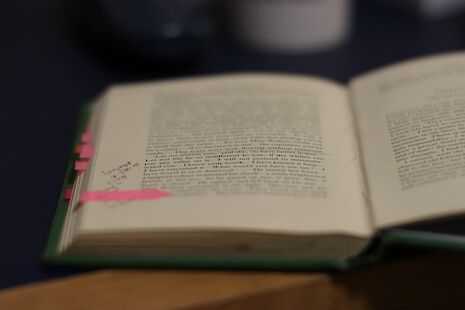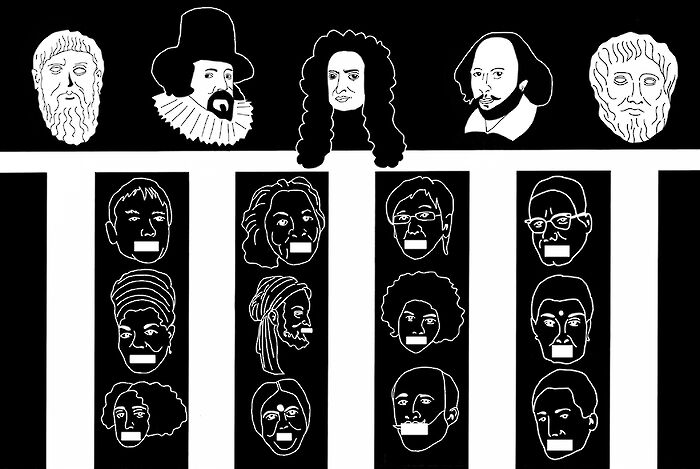Understanding the undiscussed in our history
Sophie Zhang applies the principles of decolonisation to how we learn about our nation’s history

Recently, Jeremy Corbyn has called for a greater emphasis on teaching about the “role and legacy” of British colonialism and black Britons in history in compulsory education. Closer to home, Varsity recently reported on the Royal Historical Society’s findings which showed that 96.1% of university historians are white, whilst under 1% are black. However, this issue of representation is only part of the problems within historical scholarship. As the report itself stated, relating to what Corbyn argued for, there is a ‘need for more diverse content of curriculums in schools and universities’ with current curricula ‘grounded uncritically in White histories and Eurocentric approaches to the past’.

As a nation, we need to uncover hidden histories about colonialism and its impact, and develop a critical understanding of it. Some of the appeals for a decolonised curriculum have been loudest in Cambridge, but when it comes to understanding the undiscussed past of our country, structural changes are needed in the education system.
To some extent, decolonising our curriculum is simply about teaching modern history in a truthful way. At present, we awkwardly avoid teaching colonialism at school and treat it in a whitewashed way (if it is talked about at all, that is). I remember the one time we learnt anything about colonialism during school, when my teacher told us that Britain colonised many countries by “accident”. We then spent the rest of the lesson looking at the “interesting and different” ways the British colonised countries around the world, instead of actually discussing the actions and impact of the British colonial administration.
The Western colonial powers fundamentally reshaped the modern world order and introduced new inequalities of wealth and power. Therefore, without understanding the role of British colonialism, it is impossible to understand both modern British and world history. There shouldn’t be anything alarming about expanding our curriculum in this way; as Stuart Hall so succinctly put it in a 1991 essay, “There is no English history without that other history.” We can’t understand British history without understanding Britain’s actions abroad and how people of colour contributed to British history.
“Without understanding the role of British colonialism, it is impossible to understand both modern British and world history”
Without a public understanding of the history of colonialism, it is easy to perpetuate Eurocentric and often racist discourses. For example, without sufficient knowledge about Britain’s colonial past, it is easy for people to see ex-colonies as somehow inherently poor, disorderly and backwards. This becomes not just an issue about historical truth, but also a problem that influences contemporary politics. Such backward and negative portrayals of countries in the Global South encourage many people to support questionable actions, such as harmful foreign policies, discrimination against refugees and cutting foreign aid spending.
In the specific example of foreign aid spending, people often see other countries as ‘undeserving’ of British money, with the International Development Secretary Penny Mordaunt, this year encouraging developing nations to “put their hands in their pockets” as she warned of cuts to the foreign aid budget. Yet this attitude is amnesiac, and forgets that much of Britain’s wealth came about through the exploitation of the labour and natural resources of its colonies. The problem is that without a historical understanding of both Britain’s economic exploitation of its colonies and the political disruption British colonial rule caused in countless regions around the world, it is easy to perpetuate stereotypes that encourage negative, often racist, discourses in politics, further enabling questionable daily behaviour in the form of racist remarks and actions.
Although Corbyn focused on the issue of decolonising compulsory education, it’s also vital to decolonise higher education. This is especially true for universities such as Cambridge, which have historic links to colonialism, be it through historically providing an education for colonial administrators, or through housing stolen artefacts, such as the Gweagal spears and the Benin Bronzes. Furthermore, as one of the world’s leading universities in producing research, Cambridge has an extensive influence and could encourage other universities to decolonise. This is something which Sujit Sivasundaram, co-chair of the working group behind the RHS report and a fellow at Gonville and Caius, has himself identified as he declared, ‘We’re at a point where history in Cambridge will once again change’.
But at the same time, only a small minority of the British population study at Cambridge. In order to begin a public discussion about British colonialism, it is also necessary for the conversation to begin earlier on in schooling. We must equally push for a decolonised curriculum for compulsory education at the same time as advocating a decolonised university curriculum. In the end, both elements of the country’s schooling must be decolonised and it is not a question of either or. It is only by achieving this goal that we can begin to hope for greater social awareness of the importance of decolonisation, and are able to ask bigger questions, like what would a decolonised global economy look like? What would a more egalitarian international order look like? Teaching about colonialism in depth in compulsory education is only the beginning of a much longer conversation and series of changes, all very worthwhile.
 News / Copycat don caught again19 April 2024
News / Copycat don caught again19 April 2024 Theatre / The closest Cambridge comes to a Drama degree 19 April 2024
Theatre / The closest Cambridge comes to a Drama degree 19 April 2024 Interviews / ‘People just walk away’: the sense of exclusion felt by foundation year students19 April 2024
Interviews / ‘People just walk away’: the sense of exclusion felt by foundation year students19 April 2024 News / AMES Faculty accused of ‘toxicity’ as dropout and transfer rates remain high 19 April 2024
News / AMES Faculty accused of ‘toxicity’ as dropout and transfer rates remain high 19 April 2024 News / Acting vice-chancellor paid £234,000 for nine month stint19 April 2024
News / Acting vice-chancellor paid £234,000 for nine month stint19 April 2024





